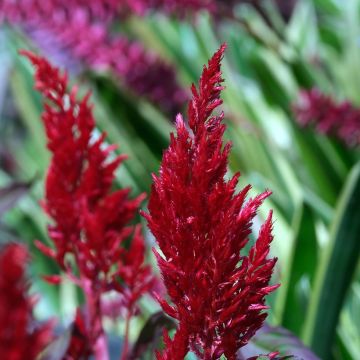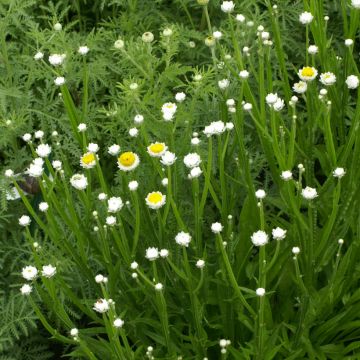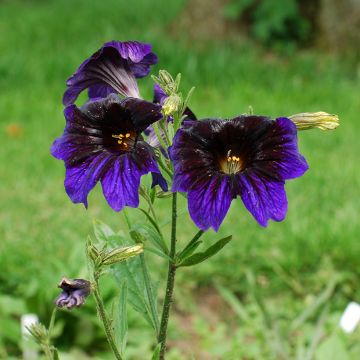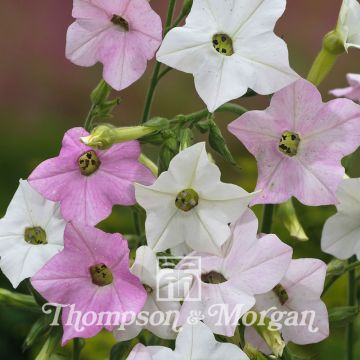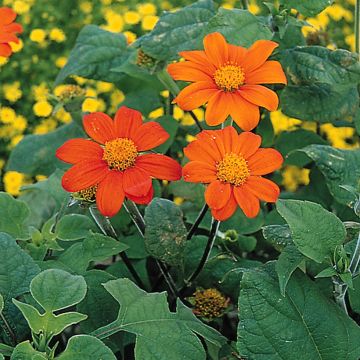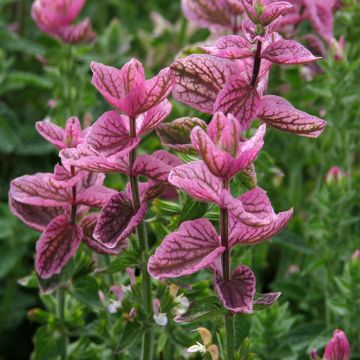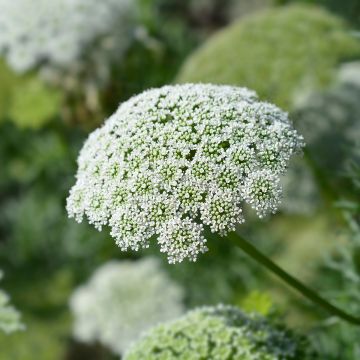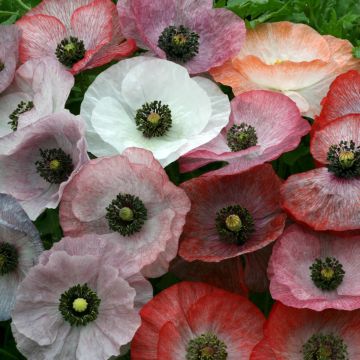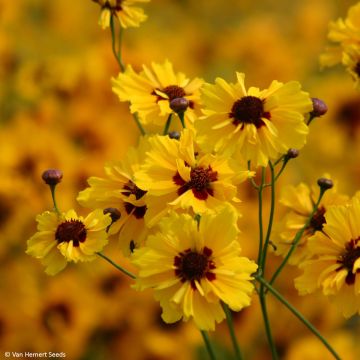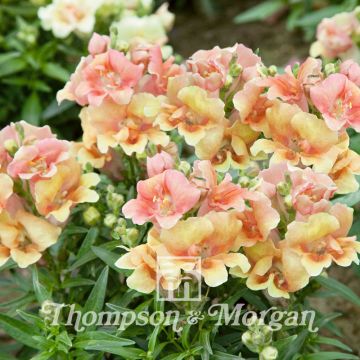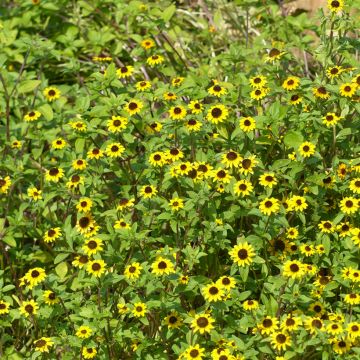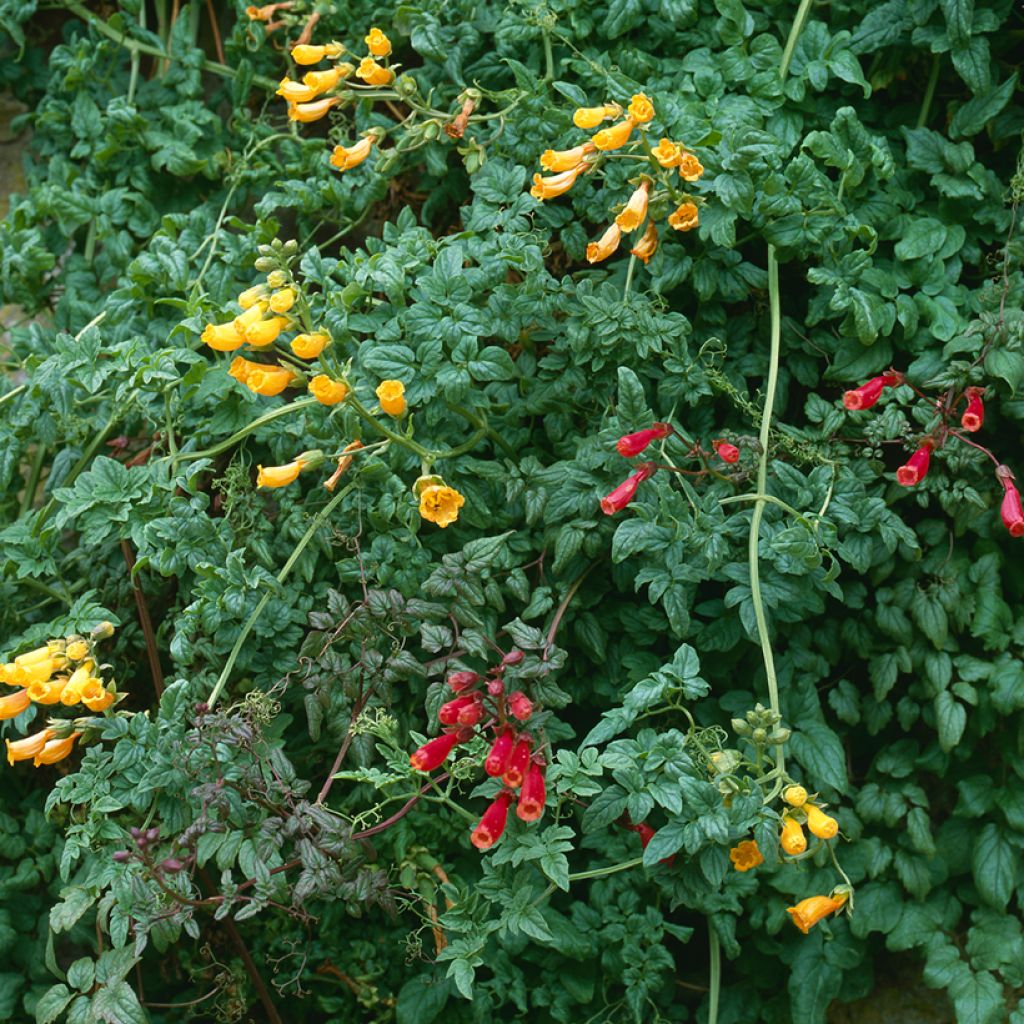

Eccremocarpus scaber Anglia Hybrids Mixed Seeds
Eccremocarpus scaber Anglia Hybrids Mixed Seeds
Eccremocarpus x scaber Anglia Hybrids mixed
Chilean Glory Flower
Special offer!
Receive a €20 voucher for any order over €90 (excluding delivery costs, credit notes, and plastic-free options)!
1- Add your favorite plants to your cart.
2- Once you have reached €90, confirm your order (you can even choose the delivery date!).
3- As soon as your order is shipped, you will receive an email containing your voucher code, valid for 3 months (90 days).
Your voucher is unique and can only be used once, for any order with a minimum value of €20, excluding delivery costs.
Can be combined with other current offers, non-divisible and non-refundable.
Home or relay delivery (depending on size and destination)
Schedule delivery date,
and select date in basket
This plant carries a 6 months recovery warranty
More information
We guarantee the quality of our plants for a full growing cycle, and will replace at our expense any plant that fails to recover under normal climatic and planting conditions.
Would this plant suit my garden?
Set up your Plantfit profile →
Description
Eccremocarpus scaber 'Anglia Hybrids Mixed' is a selection of beautiful, floriferous Chilean Glory Flower varieties. This tender perennial vine is fast-growing, rapidly covering fences, trellises and walls with brightly coloured, nodding tubular blooms. Graceful and exotic, this heat-loving plant thrives in rich, well-drained soil in a sheltered spot. In colder climates, it is often grown as an annual; however, it is possible to save the plants from year to year by growing them in pots and overwintering them indoors.
Eccremocarpus scaber or Chilean Glory Flower is a perennial climber native to the Chilean Andes. This fast-growing species is hardy down to about -10°C (under a thick layer of mulch); it is often treated as an annual in colder regions. Within a few months, it will grow to about 3 m high and 2 m wide. 'Anglia Hybrids Mixed' brings together several orange, scarlet, crimson and pink-flowering cultivars. The ridged green stems are well-branched, covered in finely cut leaflets that have slightly curled margins, ending in tendrils which enable the plant to cling to its support. From July until September (March until September in warm growing conditions), the plants feature masses of tubular, 5-lobed blooms, about 3 cm long and 1 cm wide. They range in colour from bright pink to yellow, orange and red. They are gathered in slightly loose clusters opposite the leaves. The flower buds are shiny and slightly hairy. The fragrant, nectar-rich blooms are a magnet to foraging insects. The flowers are followed by small, enclosed seed capsules, each containing several small, flat, brown seeds that germinate easily.
Chilean Morning Glory is an excellent, fast-growing climber. In one growing season, it will cover pergolas, wire fences, shrubs, small trees or unsightly garden sheds. Like regular Morning Glory, it is suitable for growing in hanging baskets or trailing over low retaining walls. Chilean Morning Glory requires rich, well-drained soil, sufficient warmth and plenty of sunshine. Well-established plants are fairly drought-tolerant. Planting the vines against a south-facing wall will improve their hardiness; in colder climates, they can be grown in containers in a conservatory.
Report an error about the product description
Flowering
Foliage
Plant habit
Botanical data
Eccremocarpus
x scaber
Anglia Hybrids mixed
Bignoniaceae
Chilean Glory Flower
South America
Other Annual flower seeds
View all →Planting and care
Sow from late winter to early spring (March-April) in sowing mix or compost. Lightly cover the seeds and keep the soil moist, but not soggy. Place in a propagator or inside a polyethylene bag until germination (usually 30-60 days at 13-15°C).
When the seedlings are strong enough to handle, transplant them into pots and move then to a cooler location. Harden them off for 10 to 15 days before planting them out in their final location, once all risk of frost is over. Make sure to leave about 90 cm between each plant.
Choose a sheltered location with plenty of sunshine. The soil should be well drained, without excess moisture, preferably slightly silty. A mixture made up of equal parts of good quality, slightly clayey garden soil, leaf compost and coarse sand will do fine. Water regularly to help the plants establish, then water occasionally during dry spells. Eccremocarpus withstands temperatures as low as -10°C. It is able to grow back from its root stock in spring if planted in very well-drained soil and protected from hard frosts and excessive humidity by a thick layer of mulch.
Growing in pots: water and feed the plants once a week during the summer. To overwinter, place the pots indoors in a cool, light room from autumn onwards and keep the soil slightly moist.
Sowing period
Intended location
This item has not been reviewed yet - be the first to leave a review about it.
Similar products
Haven't found what you were looking for?
Hardiness is the lowest winter temperature a plant can endure without suffering serious damage or even dying. However, hardiness is affected by location (a sheltered area, such as a patio), protection (winter cover) and soil type (hardiness is improved by well-drained soil).

Photo Sharing Terms & Conditions
In order to encourage gardeners to interact and share their experiences, Promesse de fleurs offers various media enabling content to be uploaded onto its Site - in particular via the ‘Photo sharing’ module.
The User agrees to refrain from:
- Posting any content that is illegal, prejudicial, insulting, racist, inciteful to hatred, revisionist, contrary to public decency, that infringes on privacy or on the privacy rights of third parties, in particular the publicity rights of persons and goods, intellectual property rights, or the right to privacy.
- Submitting content on behalf of a third party;
- Impersonate the identity of a third party and/or publish any personal information about a third party;
In general, the User undertakes to refrain from any unethical behaviour.
All Content (in particular text, comments, files, images, photos, videos, creative works, etc.), which may be subject to property or intellectual property rights, image or other private rights, shall remain the property of the User, subject to the limited rights granted by the terms of the licence granted by Promesse de fleurs as stated below. Users are at liberty to publish or not to publish such Content on the Site, notably via the ‘Photo Sharing’ facility, and accept that this Content shall be made public and freely accessible, notably on the Internet.
Users further acknowledge, undertake to have ,and guarantee that they hold all necessary rights and permissions to publish such material on the Site, in particular with regard to the legislation in force pertaining to any privacy, property, intellectual property, image, or contractual rights, or rights of any other nature. By publishing such Content on the Site, Users acknowledge accepting full liability as publishers of the Content within the meaning of the law, and grant Promesse de fleurs, free of charge, an inclusive, worldwide licence for the said Content for the entire duration of its publication, including all reproduction, representation, up/downloading, displaying, performing, transmission, and storage rights.
Users also grant permission for their name to be linked to the Content and accept that this link may not always be made available.
By engaging in posting material, Users consent to their Content becoming automatically accessible on the Internet, in particular on other sites and/or blogs and/or web pages of the Promesse de fleurs site, including in particular social pages and the Promesse de fleurs catalogue.
Users may secure the removal of entrusted content free of charge by issuing a simple request via our contact form.
The flowering period indicated on our website applies to countries and regions located in USDA zone 8 (France, the United Kingdom, Ireland, the Netherlands, etc.)
It will vary according to where you live:
- In zones 9 to 10 (Italy, Spain, Greece, etc.), flowering will occur about 2 to 4 weeks earlier.
- In zones 6 to 7 (Germany, Poland, Slovenia, and lower mountainous regions), flowering will be delayed by 2 to 3 weeks.
- In zone 5 (Central Europe, Scandinavia), blooming will be delayed by 3 to 5 weeks.
In temperate climates, pruning of spring-flowering shrubs (forsythia, spireas, etc.) should be done just after flowering.
Pruning of summer-flowering shrubs (Indian Lilac, Perovskia, etc.) can be done in winter or spring.
In cold regions as well as with frost-sensitive plants, avoid pruning too early when severe frosts may still occur.
The planting period indicated on our website applies to countries and regions located in USDA zone 8 (France, United Kingdom, Ireland, Netherlands).
It will vary according to where you live:
- In Mediterranean zones (Marseille, Madrid, Milan, etc.), autumn and winter are the best planting periods.
- In continental zones (Strasbourg, Munich, Vienna, etc.), delay planting by 2 to 3 weeks in spring and bring it forward by 2 to 4 weeks in autumn.
- In mountainous regions (the Alps, Pyrenees, Carpathians, etc.), it is best to plant in late spring (May-June) or late summer (August-September).
The harvesting period indicated on our website applies to countries and regions in USDA zone 8 (France, England, Ireland, the Netherlands).
In colder areas (Scandinavia, Poland, Austria...) fruit and vegetable harvests are likely to be delayed by 3-4 weeks.
In warmer areas (Italy, Spain, Greece, etc.), harvesting will probably take place earlier, depending on weather conditions.
The sowing periods indicated on our website apply to countries and regions within USDA Zone 8 (France, UK, Ireland, Netherlands).
In colder areas (Scandinavia, Poland, Austria...), delay any outdoor sowing by 3-4 weeks, or sow under glass.
In warmer climes (Italy, Spain, Greece, etc.), bring outdoor sowing forward by a few weeks.






























